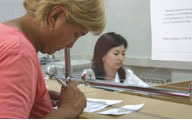
Strengthening the Microfinance Lending Community
The Central Asia Micro-Finance Alliance (CAMFA) was one of a new generation of ACDI/VOCA credit projects created to address marketplace demand for financial services and products through the establishment of, targeted assistance to and support of local financial institutions to help them become effective and self-sustainable. Initiated by ACDI/VOCA and funded by USAID, the $14 million, four-year project worked to strengthen the microfinance lending community in Kazakhstan, Kyrgyzstan, Tajikistan and Uzbekistan by studying the needs of prospective customers and offering a broad range of innovative financial solutions, technical assistance and training. In 2006, ACDI/VOCA received additional funding to build on the project’s successes by implementing a three-year (2006-2009), USAID-funded project called CAMFA II. To learn more about CAMFA II, click here.
At the end of the project, CAMFA, which was an umbrella group of microfinance institutions (MFIs), microfinance associations (MFAs) and credit unions, had an active portfolio of $8 million and a total of 27 active partner institutions, including 4 microfinance associations, which themselves support over 60 MFIs. CAMFA’s partner institutions had disbursed over $55 million worth of loans with over $38 million issued to women. With technical assistance help from CAMFA, the MFIs had issued 93,000 loans in all, including 68,000 of those loans being made to women. CAMFA partners’ average portfolio at risk rate was a remarkably low .08 percent.
CAMFA’s goal was to support “developing” MFIs to help them move into the “mature” category with lower financial risk, increased sustainability, stronger management and improved outreach. CAMFA provided a wide range of training opportunities to the MFIs in the region and facilitated access to best-practice organizations through formal study tours and on-site visits. By project’s end, most of CAMFA’s partners had achieved an average 142 percent operational self-sufficiency rate, 26 MFIs had become accredited, over 300 participants had been trained in workshops on issues such as management information systems (MIS), fraud prevention, loan-tracking and incentive systems and over $890,000 had been disbursed through CAMFA mini-grants.
CAMFA also developed its own series of training programs in governance, fraud prevention, association training and commercialization. In September 2005, CAMFA held its third regional workshop on building sustainable institutions in Central Asia in Almaty, Kazakhstan, where over 200 participants discussed technical topics relevant to microfinance and networking. The CAMFA team also provided legal and regulatory guidance and funding to nongovernmental organizations (NGOs) and MFIs to help them get accredited.
The ACDI/VOCA-led alliance, including FINCA and the Micro Finance Center in Poland, works on many levels to strengthen existing lending organizations, support more transparent lending operations and create new lending entities in underserved areas of Central Asia. CAMFA is based in Tashkent, Uzbekistan, and works with microfinance organizations, credit unions, agricultural support organizations and other lending organizations that seek to create employment and alleviate poverty. The alliance provides the regional lending community with specialized technical assistance, financing for MIS and accounting software, support to attend local and international training, lending capital, and best-practice microfinance resources. CAMFA organized its own annual workshop for the NGO and MFI community, bringing together regional practitioners to discuss challenges and lessons learned.
CAMFA also provided legal and regulatory guidance to NGOs and MFIs through hands-on advice from lawyers and legal experts who assist with registration. Additionally, CAMFA’s USAID-funding provided financial assistance to FINCA to assist in the establishment of a FINCA/Uzbekistan and FINCA/Tajikistan. These programs provided direct lending assistance to microentrepreneurs throughout the two countries. For more information on FINCA, visit:www.villagebanking.org.




